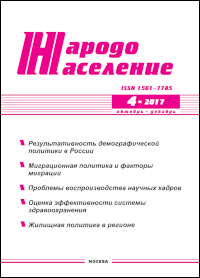Оценка эффективности системы здравоохранения в России
Для цитирования
Назарова В. В., Борисенкова К. А. Оценка эффективности системы здравоохранения в России // Народонаселение. 2017. Том 20. № 4. С. 119-134.
Аннотация
статья посвящена оценке эффективности российской системы медицинского обеспечения с помощью современных инструментов анализа, в частности моделирования эффективной границы (SFA — Stochastic Frontier Analysis). SFA представляет собой зависимость средней ожидаемой продолжительности жизни от объемов государственных расходов на здравоохранения, среднего количества лет обучения и факторов риска для здоровья в качестве объясняющих переменных. В настоящее время прослеживается значимое отставание российской системы здравоохранения от многих развитых стран по основным показателям состояния здоровья общества. Используемый метод предполагает расчет производственной функции здоровья, позволяющей оценить, как нерациональное использование ресурсов влияет на различные показатели здоровья. Итогом построения функции выступает расчет средней продолжительности жизни населения, представляющий собой линейную зависимость некоторого набора объясняющих переменных. На данных 11 стран за период с 2000 по 2013 гг. была доказана прямая зависимость продолжительности жизни от неравенства в доходах населения, измеренного коэффициентом Джинни, и обратная зависимость — со среднедушевым доходом и долей государственных расходов на здравоохранение в общем объеме государственных расходов. В заключении даны рекомендации по совершенствованию системы здравоохранения в России. Например, внедрение системы соплатежей населения на определенный перечень услуг; создание единой системы по использованию ресурсов и управлению в сфере медицинского обеспечения; развитие государственно-частного партнерства в сфере здравоохранения, сбалансированность федерального и регионального финансирования здравоохранения будет способствовать повышению эффективности системы медицинского обслуживания.
Ключевые слова:
медицинское обеспечение, производственная функция здоровья, стохастическая грани-ца, эффективность, государственное финансирование здравоохранения
Литература
Котляров И. Д., Балашов А. И. Противоречия государственной политики по регу-лированию цен на лекарственные средства: проблемы и пути их решения // Вопросы экономики. — 2011. — № 10. — С. 142-155
Всемирная организации здравоохранения. [Электронный ресурс]. — Режим доступа: http://www.who.int/mediacentre/factsheets/fs339/ru/
Здравоохранение в России 2015. Федеральная служба государственной̆ статистики. — 2015. — 176 с.
Medeiros J., Schwierz C. (2015). Efficiency estimates of health care systems. European Economy, Economic Papers. No. 549.
Всемирный банк. [Электронный ресурс]. — Режим доступа: http://databank. worldbank.org/data/reports.aspx? source=world-development-indicators
Российский статистический ежегодник. [Электронный ресурс]. — Режим доступа: http://www.gks.ru/bgd/regl/b13_13/Main.htm
Скобелин О. И. Проблема оценки эффективности системы обязательного медицин-ского страхования // Вестник Финансового университета. — 2011. — № 6. — С. 81–86.
Дуганов М. Д. Оценка эффективности расходов на здравоохранение на региональном и муниципальном уровнях. — М.: ИЭПП, 2007.
Sherman H. D. (1984). Hospital efficiency measurement and evaluation: Empirical test of a new technique. Medical Care, Vol. 22, No. 10, pp. 922–938.
Aigner D., Lovell C. A. K., Schmidt P. (1977). Formulation and estimation of stochastic frontier production function models. Journal of Econometrics, Vol. 6, No. 1, pp. 21–37
Giuffrida A., Gravelle H. (2001). Measuring performance in primary care: econometric analysis and DEA. Applied Economics, Vol. 33, No. 2, pp. 163–175.
Jacobs R. (2001). Alternative methods to examine hospital efficiency: data envelopment analysis and stochastic frontier analysis. Health Care Management Science, Vol. 4, No. 2, pp. 103–115.
Aka B. F., Dumont J. C. (2008). Health, education and economic growth: Testing for long-run relationships and causal links in the United States. Applied Econometrics and International Development, Vol. 8, No. 2, pp. 101–113.
Рязанцев С.В. В., Храмова М.Н., Гришин А.С. Дифференциация смертности от внешних причин в Российской Федерации и Республике Беларусь // Научное обо-зрение. Серия 2. Гуманитарные науки. — 2017. — № 4-5. — С. 5-14.
Шишкин С. В., Селезнева Е. В., Потапчик Е. Г., Попович Л. Д., Шейман И. М. Модернизация здравоохранения: новая ситуация и новые задачи. — М.: Дело, 2010
Всемирная организации здравоохранения. [Электронный ресурс]. — Режим доступа: http://www.who.int/mediacentre/factsheets/fs339/ru/
Здравоохранение в России 2015. Федеральная служба государственной̆ статистики. — 2015. — 176 с.
Medeiros J., Schwierz C. (2015). Efficiency estimates of health care systems. European Economy, Economic Papers. No. 549.
Всемирный банк. [Электронный ресурс]. — Режим доступа: http://databank. worldbank.org/data/reports.aspx? source=world-development-indicators
Российский статистический ежегодник. [Электронный ресурс]. — Режим доступа: http://www.gks.ru/bgd/regl/b13_13/Main.htm
Скобелин О. И. Проблема оценки эффективности системы обязательного медицин-ского страхования // Вестник Финансового университета. — 2011. — № 6. — С. 81–86.
Дуганов М. Д. Оценка эффективности расходов на здравоохранение на региональном и муниципальном уровнях. — М.: ИЭПП, 2007.
Sherman H. D. (1984). Hospital efficiency measurement and evaluation: Empirical test of a new technique. Medical Care, Vol. 22, No. 10, pp. 922–938.
Aigner D., Lovell C. A. K., Schmidt P. (1977). Formulation and estimation of stochastic frontier production function models. Journal of Econometrics, Vol. 6, No. 1, pp. 21–37
Giuffrida A., Gravelle H. (2001). Measuring performance in primary care: econometric analysis and DEA. Applied Economics, Vol. 33, No. 2, pp. 163–175.
Jacobs R. (2001). Alternative methods to examine hospital efficiency: data envelopment analysis and stochastic frontier analysis. Health Care Management Science, Vol. 4, No. 2, pp. 103–115.
Aka B. F., Dumont J. C. (2008). Health, education and economic growth: Testing for long-run relationships and causal links in the United States. Applied Econometrics and International Development, Vol. 8, No. 2, pp. 101–113.
Рязанцев С.В. В., Храмова М.Н., Гришин А.С. Дифференциация смертности от внешних причин в Российской Федерации и Республике Беларусь // Научное обо-зрение. Серия 2. Гуманитарные науки. — 2017. — № 4-5. — С. 5-14.
Шишкин С. В., Селезнева Е. В., Потапчик Е. Г., Попович Л. Д., Шейман И. М. Модернизация здравоохранения: новая ситуация и новые задачи. — М.: Дело, 2010
Форматы цитирования
Другие форматы цитирования:
APA
Назарова, В. В., & Борисенкова, К. А. (2017). Оценка эффективности системы здравоохранения в России. Народонаселение, 20(4), 119-134. извлечено от https://www.jour.fnisc.ru/index.php/population/article/view/6572
Раздел
ЗДРАВООХРАНЕНИЕ В РОССИИ








